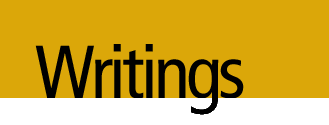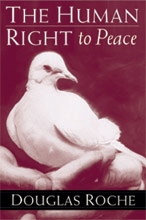The Human Right to Peace
Senator Douglas Roche, a former journalist, diplomat, and educator who has also served at the UN, has been actively involved in issues related to
disarmament and development for 30 years. His passion for the subjects is
evident in this, his latest of 16 books. Here, Roche argues persuasively for the
need to supplant our current culture of war with a culture of peace. Such an
argument might seem like youthful idealism, but Roche's impressive credentials
combined with years of experience travelling in regions devastated by war and
poverty lend his ideas a credibility, even a pragmatism, that is hard to dismiss.
What is paramount to Roche is the urgent need for such a paradigm shift in an
age where the potential for mass destruction has grown with the number of
international players who have acquired nuclear weapons. The spread of terrorism
around the world has made the potential for such attacks even more real. He
debunks what he believes to be the "massive lie" of these weapons - that they
create security - and reveals how, despite decades of disarmament treaties and
declarations, the world's largest powers continue to allow their own weapons
arsenals to proliferate.
The Human Right to Peace offers an excellent primer on the conflicts of the
20th century, paying close attention to events of the last few decades and
culminating in the very recent developments in Iraq. Roche p r ovides a wealth of statistics as well as an assessment of the impact of international conferences and treaties relevant to disarmament, development, environmental, and peace initiatives.
Roche also explores the crucial roles that need to be played by the UN - a
body that he strongly supports and whose important work he feels is often
undervalued. He is optimistic about the potential for recent technologies,
especially the Internet, to empower individuals for action within both global
and local contexts.
Emily Donaldson
October issue of Quill & Quire
Roche book takes aim at U.S. military-industrial complex
A new book by independent Senator Douglas Roche takes great exception to the growing power and size of America's military, dismissing it as the product of a "destruction industry" to which American legislators are beholden.
"The political power of the military-industrial complex dwarfs ordinary lobbyists in Washington. Not only are the political campaigns of many politicians funded by such companies, once in office these legislators find it virtually impossible to say no to the demands of the military-industrial complex to approve new weapons systems," writes Sen. Roche in, The Human Right to Peace.
The book is expected to hit book stores this September, but an advance copy was obtained by The Hill Times. A major theme explores whether "weapons bring security." Sen. Roche writes that "nowhere is this lie more pronounced than in the rationale for the maintenance of nuclear weapons."
But the main point of the book is to "give people a sense of hope," stressed Sen. Roche in an interview.
The first part of his book is devoted to explaining culture of war and how detrimental it is to the international peace and security while the remaining two thirds of the book elaborate the need to bring in a culture of peace and the possible results that can come out if peace is considered and accepted by the international community in its true spirit as a fundamental human right.
The Human Right to Peace is Sen. Roche's 16th book. He has held numerous distinguished positions in his career spanning over four decades. Sen. Roche served as Canada's Ambassador for disarmament from 1984 to 1989 and was elected chairman of the United Nations Disarmament Committee in 1988. He has also served as a Member of Parliament four times from 1972 to 1984. He was appointed to the Senate of Canada in 1988.
Senator Roche, who, as a journalist, Parliamentarian, diplomat and educator, spent four decades as an advocate of peace, argues that thousands of people around the world have done an enormous amount of work to build a culture of peace in opposition to the culture of war. The demonstration of hundreds of thousands of people in numerous countries around the world against the U.S. attack on Iraq was a good recent example of this movement, but he said more needs to be done.
In his book, he argues that religions, education and civil society can play a major role in bringing in a culture of peace.
"History shows that the true shapers of past cultures and civilizations have not been political leaders so much as spiritual leaders: Confucius, Buddha, Abraham, Moses, Jesus, Paul, and Mohammed. Their teachings have shaped values and ethics, informed social systems and evaluated the justice and injustice of political, economic and social systems," he writes.
In the Senator's view, peace education "from nursery school to post-doctoral programs" should be included in the school curriculums in order to promote the cause of bringing a culture of peace. He says that this can prove to be a fruitful investment for future generations.
Moreover, he argues that "civil society" is a new emerging force in the 21st century and it can play a key role in creating a culture of peace. He adds that all great movements in history "from abolition of slavery to women's equality" were initiated by ordinary people, not by governments.
In the interview, Sen. Roche said that the world cannot be saved from the horrors of weapons of mass destruction and other conventional weaponry by any one sermon or any one book. Instead, he said in the interview, each member of the society in his or her own way has the responsibility to make a contribution towards achieving the cause of peace. He added that he has tried to do his part by writing this book.
"I have no illusions and certainly [I have] no magic button but neither does Kofi Annan. He is making a contribution at a very high level and I am making a contribution at a modest level in which I am trying to help readers. The book is written globally centric, it's not Canadian centric."
F. Abbas Rana
The Hill Times
2003.08.25

